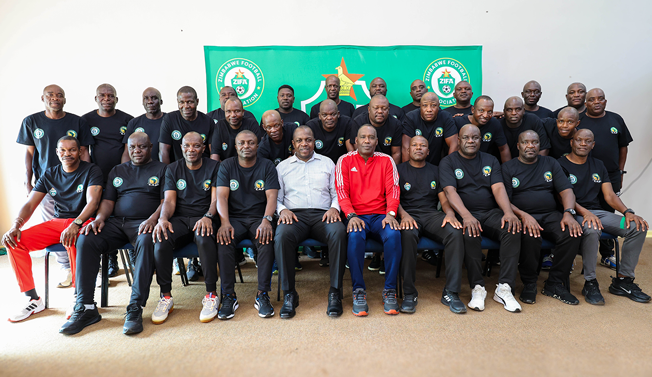If you have ever sat in a kombi after a Warriors match or joined a WhatsApp football group, you will
know this debate all too well: “That player excites us – he deserves the jersey!” versus “But what does
he actually contribute on the pitch?”
Football, by its nature, is emotional. A single dribble, a goal in a big match, or even the way a player
celebrates can make fans fall in love. Yet, as every seasoned coach will tell you, sometimes the players
who excite us the least are the ones who carry the team the furthest.
Think of John Phiri, a defensive stalwart whose name rarely made the headlines. He was not the type
to dribble past three defenders or score from range. But when he was off the pitch, his absence was
glaring – suddenly the team seemed to lose its shape, opponents found more space, and the team
looked exposed. His quiet consistency was the glue that held it all together.
Or recall Ernest Masango (Chigama) from the Dynamos squad that reached the CAF Champions
League team of 1998. He was not the most flamboyant of that golden generation, but his work rate,
tactical discipline, and selfless contribution were as important as the stars who grabbed the spotlight.
Sunday “Mhofu” Chidzambwa, the coach of the team ignored many calls and reports criticizing his
selection of the player, but he stuck to his guns.
These stories remind us of a simple truth: football success is built not only on stars, but on systems
that recognise and reward every type of contribution. And this is where modern football is changing
– where passion meets precision.
From Emotion to Evidence
Football has entered a new era worldwide. Team selection is no longer based on instinct alone
but is increasingly driven by data, analysis, and science. GPS tracking vests now record how far
and how fast players run, the number of sprints they make, and their positioning on the pitch.
Video analysis breaks down every pass, interception, and tackle, offering a clear picture of each
player’s contribution. At the same time, sports science monitors fatigue, nutrition, hydration, and
recovery to ensure athletes are in peak condition when it matters most.
Across clubs globally, and increasingly in Africa, this integration of data and science has become
the difference between simply competing and consistently winning. Success today is built not
only on brilliant players, but also on the ability to measure, monitor, and maximise every detail
of performance.
Zimbabwe’s Opportunity
For Zimbabwe, embracing science in football is not a luxury but a necessity. For too long we
have relied on natural talent alone. And yes, that talent has taken us far. The Warriors have
produced extraordinary footballers who earned international respect. But talent without systems
of measurement and support is not enough to deliver consistent victories.
That is why ZIFA is making a deliberate shift, building the capacity to integrate data and science
into the structures of our game. National team players will no longer be judged by reputation
alone, but by measurable performance indicators such as distance covered, ball recoveries,
passing accuracy, and chance creation. In partnership with universities and medical
professionals, a Sports Science and Medicine Unit will be established to track fitness, monitor
injury risks, and design tailored conditioning programmes for players.
Coaches and technical staff will also receive training in video analysis and modern performance
evaluation tools, ensuring that data is not just collected but effectively applied. At the same time,
young players in academies and schools of excellence will be tracked through a central database,
allowing their progress to be monitored over time and ensuring that no talent is lost as they grow
through the age groups.
Practical Examples: What This Means on the Ground
To make this vision real, imagine a national team camp in the near future. A midfielder runs 12
kilometres in a match, but GPS data reveals that his high-intensity bursts fall short compared to
his teammates. With that insight, coaches create tailored sprint sessions to unlock his explosive
power. A striker goes through a dip in form, scoring fewer goals. Video analysis shows that his
movement in the box has become less dynamic than it was six months ago. Armed with this
knowledge, the technical team sharpens his runs and restores his killer instinct. A defender
complains of fatigue. Sports science monitoring reveals his recovery rate is below optimal.
Instead of risking injury, coaches adjust his workload and nutrition, making sure he returns fully
fit for the matches that matter most.
This is not a dream. It is the present reality of the best teams in Africa and across the world. Our
mission at ZIFA is to bring this standard home – to weave science into the very fabric of
Zimbabwean football, creating a culture where talent and intelligence combine to produce
excellence.
Fans, Feelings, and Facts
Let us return to the fan debate: “He excites us” versus “What does he contribute?” Both sides of this
debate matter. Football is about emotion. Fans must feel proud, excited, and inspired. The artistry of
a Khama Billiat, the courage of a Benjani Mwaruwari, the brilliance of a Peter Ndlovu – these moments
are priceless.
But when the dust settles, winning requires balance. It requires the unsung heroes like John Phiri and
Ernest Masango, whose contributions can be measured, even if they are not always celebrated.
Science allows us to appreciate both – the artistry and the efficiency. It allows us to field teams that
do not just excite us, but also deliver results.
The ZIFA Commitment
We are not speaking in a vacuum. ZIFA is implementing a Partnership Management Strategy that
includes collaboration with universities, medical schools, corporate partners, and technology
providers. Our goal is not only to use these systems at national team level, but to make them a resource
for clubs and academies across Zimbabwe.
Imagine Dynamos, CAPS United, Highlanders, or Chicken Inn with access to player performance
data. Imagine school tournaments where talent is tracked scientifically, so no player is lost in the
cracks. Imagine women’s football benefiting from the same professional structures, ensuring the next
Mighty Warriors are fitter, stronger, and better prepared.
This is the Zimbabwe we are working towards: a football system that values both the heart and the
numbers, both the passion of the fans and the precision of science.
A New Chapter
Our journey will not be simple. Resources are limited, and change takes time. But every step matters.
Every new tool we adopt, every coach we train, every player we monitor – these are investments in
the future of Zimbabwean football.
In the end, football is still the beautiful game. It still stirs emotions in kombis, in homes, and in
stadiums across our nation. But if we want to compete and win on the continental and global stage,
we must add science to the spirit.
Football is feeling, but football is also facts. When we bring those two together, we will write the next
great chapter of Zimbabwean football.
More News

Sharpening the Touchline before Kick-off
Mon 9 Feb 2026
As Zimbabwe’s topflight clubs put the finishing touches to their preparations ahead of the new season, a quieter but equally significant process is unfolding at ZIFA Village. This week, the CAF A Coaches Refresher Course is underway, bringing together some of the country’s most experienced coaches at a moment when clarity of ideas, sharp thinking […]

